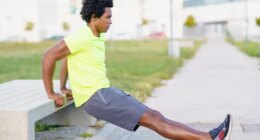POV: You just came off a cross-country redeye, and you’ve finally arrived at your picturesque travel destination feeling far from glamorous. (Read: Skin is feeling dry and crusty; body is dehydrated and in desperate need of a shower.)
The reason this always seems to happen after long travel days isn’t a mere coincidence, says Jennifer Williams, MPH, a hydration scientist with Abbott… it’s science. According to Williams, there is significantly less moisture in the air when you’re cruising at an altitude of 35,000 feet, which she says is a “recipe for dehydration.” So, how can one stay well-hydrated (a key indicator of healthy aging, BTW) when traveling for many hours? The hydration expert has five simple rules you should follow the next time you’re boarding a flight.
Why flying in an airplane often leads to dehydration, according to a hydration scientist
According to Williams, while air travel is convenient (or, IMO, an unavoidable-yet-necessary evil), it can impact your body in more ways than just giving you a leg cramp. Namely, it can be a sneaky cause of serious dehydration. “Cabin humidity hovers at 10-20 percent compared to the normal 40-60 percent levels we enjoy on the ground. Between low air pressure, desert-like levels of humidity, and decreased fluid intake from rushing between flights—it’s a recipe for dehydration,” Williams says.
The impact that dehydration can have on the body (and on pending vacation plans) is no joke. “Even mild dehydration can have a big impact on kids or adults. Research shows that losing just two percent of your body’s water can negatively affect your mood, memory, and coordination,” Williams says. Or in more extreme scenarios, severe dehydration can result in headaches, brain fog or confusion, fatigue, mood swings, lightheadedness, and dizziness.
5 tips for staying hydrated when traveling
1. Pregame—with water, silly—before hitting the airport
Yes: By pregame, we mean sipping on copious amounts of water and skipping the preflight mimosa that can exacerbate looming dehydration. According to Williams, your hydration levels before stepping foot on the flight are critical to monitor. “Creating a good hydration base prior to taking off is critical, especially for those longer flights or delays,” she says. “Getting ready for a trip can be taxing as you race to wrap up normal activities while packing and getting off to the airport. In the 8-12 hours before your trip, do a hydration check and make sure you’re proactively drinking water and other fluids.”
How to conduct the aforementioned “hydration check”? Williams says the clarity lies in the toilet bowl (pun intended). “While thirst may not be a perfect indicator of hydration status, urine color is a pretty reliable one. If you’re well-hydrated, your urine should be clear or light yellow. Dark yellow or amber urine can be a telltale sign of dehydration,” she says.
“While thirst may not be a perfect indicator of hydration status, urine color is a pretty reliable one. If you’re well-hydrated, your urine should be clear or light yellow. Dark yellow or amber urine can be a telltale sign of dehydration.”—Jennifer Williams, MPH, hydration scientist with Abbott
2. Pack a reusable water bottle
It’s no secret that everything at the airport convenience store tends to be marked-up. Why spend so much on an overpriced bottle of water when you can pack a reusable one to fill up after getting through security? “This trick is so simple, but it’s something most travelers overlook. Packing an empty, reusable water bottle is not only great for the environment—and your wallet—but it’s also a good way to stay on track with your water intake,” Williams says. “As a general rule, aim to consume about eight ounces of water for every hour you’re in the air. It may mean extra trips to the lavatory, but moving around is also beneficial on long flights.”
READ RELATED: Onions Nutrition Benefits the Heart, Bones & More (+ Onion Recipes)
*Books aisle seat.*
3. Electrolytes are your BFFs
When plain ol’ water isn’t enough, Williams recommends adding a boost of super-hydrating electrolytes. “Electrolytes, such as sodium, potassium, and chloride, are minerals that help balance and regulate the fluids in your body and are essential for muscle and nerve function. You get electrolytes from what you eat and drink, and you lose them any time you expel fluids,” she says.
Williams’ go-to? It’s simple: Pedialyte. “Before you travel, tuck an electrolyte powder like Pedialyte—which has a science-backed optimal balance of glucose and electrolytes to help replenish vital fluids and electrolytes—into your carry-on to mix with water during long flights or layovers,” she says. Not to mention: It can be a lifesaver if your digestion gets out of balance while traveling.
4. Nosh on hydrating snacks
Although you may be inclined to pick up a bag of deliciously salty chips, Williams says you might want to opt for super-hydrating foods instead (at least as you’re traveling). “According to the Academy of Nutrition and Dietetics, 20 percent of your daily fluid intake should come from foods you eat. Foods like cucumber, watermelon, and strawberries, which are more than 90 percent water, can be especially helpful,” she says. To that end, Williams recommends packing some fruit and veggies in your carry-on for in-flight crunching purposes.
5. Don’t forget to pack the lip balm!
Because skin hydration doesn’t exactly come from within (!), using hydrating skin-care products for long travel days is one of the best ways to quench your parched pores. As such, Williams shares a friendly reminder: Pack your TSA-approved moisturizer and lip balm to carry onboard for your mid-flight beauty routine. “With lower levels of humidity and hydration, your skin can dry out fast. Applying moisturizers frequently while you’re flying the friendly skies is a great way to keep your face, hands, and lips from drying out,” Williams says.
An RD shares a list of the most hydrating foods:
Source




